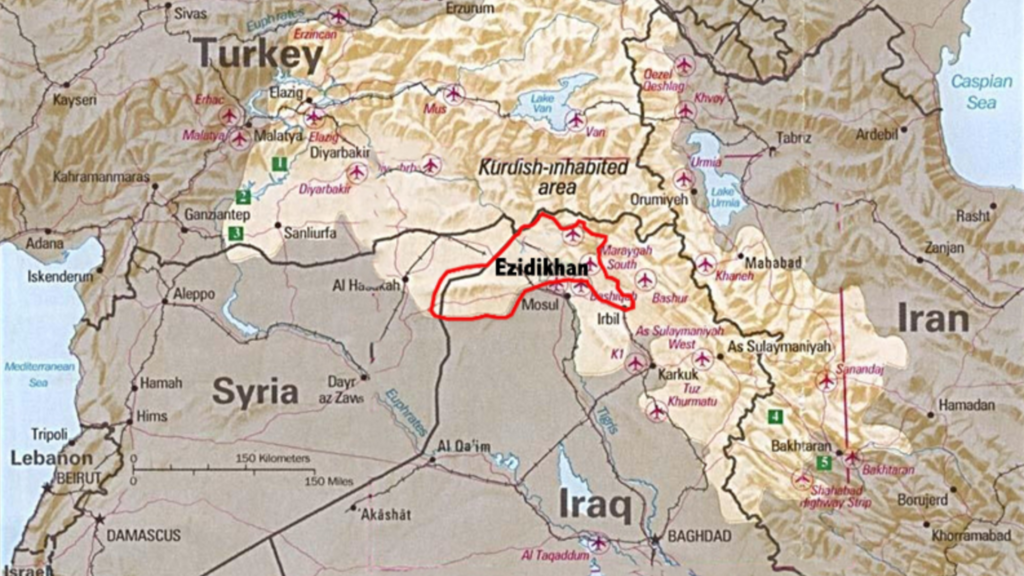


Lalish, Ezidikhan. 19 April 2023. The Ezidikhan government, in collaboration with CWIS has developed a permanent international tribunal and has completed the Working Draft of the Nations International Criminal Tribunal (NICT) Charter. The Indigenous Nation of Ezidikhan is made up of more than 1 million Yezidi in northern Iraq, Armenia, Georgia, Syria and Turkey.
The NICT Charter is an important development for indigenous peoples, as it seeks to establish a permanent international criminal tribunal to hold accountable perpetrators of cultural and mass violence against indigenous peoples. The Charter recognizes that the International Criminal Court and the International Court of Justice do not exercise jurisdiction over such crimes against indigenous peoples.
Under the initiative and direction of CWIS and indigenous international relations expert, Rudolph Ryser, the governments of Ezidikhan and Republic of Armenia are engaged in cooperative talks to establish the tribunal inside Armenian territory. While the Armenians established their sovereignty in the 1920s and eventually established the internationally recognized state of Armenia with its capital in Yerevan in 1992, the Yezidi formed their sovereign government of Ezidikhan with its capital in Lalish in 2017.
Indigenous Armenians and the Ezidikhan government have come together to establish the Nations International Criminal Tribunal. Both governments seek to hold accountable those responsible for committing cultural and mass violence crimes against many of the more than 5000 indigenous peoples.
The process of drafting the Tribunal Charter began in 2018 when the Ezidkhan Governing Council, working with the guidance of CWIS, authorized the effort to establish a new international tribunal. Ezidikhan Prime Minister Barjis Soho Khalaf authorized establishment of an international Charter Panel in December 2022 to refine the draft charter for the Tribunal. The prime minister directed the panel to include ten international law and human rights experts, including Francesco Cessa from Italy and Andrew Reid from the United States.
Rudolph Ryser at The Center for World Indigenous Studies coordinated the 18-week Charter draft process, with human rights law expert Mohamed Aboelazm from Egypt serving as the Charter Panel Chair and Nallein Sowilo, the Ezidikhan Justice Minister, as the Co-chair. Other members of the panel included Dr. Maareen Eke from the indigenous Republic of Biafra, Patrick Harrigan, a Southwest Asia scholar, Dr. Hiroshi Fukurai, a human rights legal scholar originally from Japan, Irene Delfanti, a communications researcher from Italy, and Aline Casteñada, Executive Assistant to the Center for World Indigenous Studies in Mexico.
Unlike the International Genocide Convention of 1948, the new Charter recognizes mass murders, forced demographic change, expulsions, exploitation, apartheid, slavery, torture, and physical, ecological, and cultural genocide, and denial of sovereignty and self-determination of nations as prosecutable crimes.
The NICT Charter Preamble recognizes that for centuries, the nations of the world have suffered horrific acts in which millions of children, women, and men, and whole peoples have been victims of atrocities such as invasions, religious oppression, colonization, trauma, ethnic cleaning, economic destruction, forced removal of children, sexual violence against women. The crimes of starvation, and food insecurity, occupations, and forced settlements, forced denial of sexual orientation, forced assimilation, and uprooting are also recognized under the Charter’s legal code. Unlike the International Genocide Convention of 1948, the new Charter recognizes mass murders, forced demographic change, expulsions, exploitation, apartheid, slavery, torture, and physical, ecological, and cultural genocide, and denial of sovereignty and self-determination of nations as prosecutable crimes.
The Charter Panel notes that international agreements and treaties between States’ governments and other legal instruments adopted to protect against and punish crimes carried out against peoples have failed to provide the Nations of the world with access to justice, denying due process by granting immunity to officials and citizens of States, or politicizing judicial systems.
The NICT Charter affirms that the international legal order recognizes that the Nations of the world and customary laws are fully entitled to full recognition and dignity, political equality with States, basic rights, and freedom from cultural and mass violence.
The Charter seeks to provide Nations of the world with due process, redress, and remedy for criminal acts by granting access to justice and denying immunity to officials and citizens of States. The Charter recognizes that customary laws are fully entitled to the full recognition and dignity, political equality with States, basic rights, freedom from inhuman and degrading treatment.
Furthermore, the Charter ensures comity between Nations and States and the rights of Nations to self-determination, self-government, and controlling their natural resources.
The NICT Charter affirms that it is the duty of all indigenous Nations and peoples and States to exercise lawful jurisdiction over States or Nations, persons, business organizations, government and non-government organizations, intergovernmental organizations, armed groups, and other entities responsible for internationally recognized crimes. Each Nation and State’s commitment to upholding the purpose and principles of this Charter and the International Covenant on the Rights of Indigenous Nations (as set forth in ANNEX D of the Charter) is confirmed by signing and ratifying the Charter.
The completion of the Working Draft of the Nations International Criminal Tribunal (NICT) Charter, and a negotiated agreement between the governments of Ezidikhan and Armenia followed by ratification by indigenous nations and state’s governments projected by the Fall of 2023 is an important milestone for indigenous peoples.
If you wish to support the work we are doing, please consider making a tax-deductible donation to the Center for World Indigenous Studies. Your support allows us to aid indigenous peoples around the world.
The library is dedicated to the memory of Secwepemc Chief George Manuel (1921-1989), to the nations of the Fourth World and to the elders and generations to come.
access here